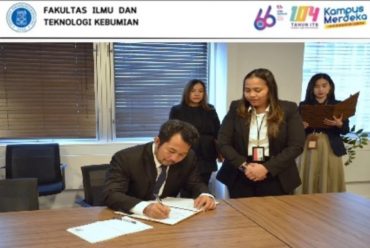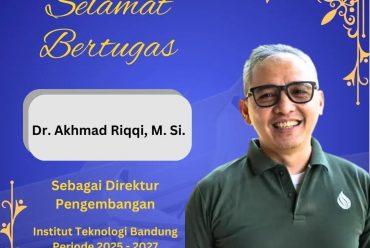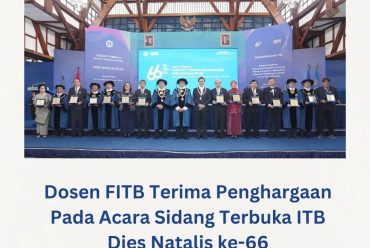Creating an Inspiring Campus: Foundation and Collaboration for a World-Class ITB
Creating an Inspiring Campus: Foundation and Collaboration for a World-Class ITB
Summary of Presentation by the Rector and Vice Rectors at the Starting of Semester I 2025/2026 Meeting, West Hall, August 27, 2025
By the Dean of FEST (Dr. Dudy Darmawan Wijaya, Dr. Rusmawan Suwarman, and Dr. Dasapta Erwin Irawan)
Abstract: The Bandung Institute of Technology (ITB) is committed to enhancing its reputation as a world-class university by focusing on increasing the number of doctoral students and international research collaborations. With a budget allocation of 75 billion rupiah, ITB aims to achieve a global ranking of 150. This transformation requires adaptive leadership, clear division of tasks, and human resource capacity development, as well as collaboration based on a shared vision to create widespread positive impact.
In its transformation journey toward becoming a world-class university, the Bandung Institute of Technology (ITB) is formulating a comprehensive strategy focused on strengthening academic foundations and developing collaborations. This vision was presented in an open discussion highlighting concrete steps to enhance the institution’s reputation on the global stage.

Photo by Drew Beamer on Unsplash
Strategic Priorities: Doctoral Students and Collaborative Research
To elevate ITB’s reputation to a higher level, two main priorities have been identified. First, a significant increase in the quantity of doctoral (PhD) students. Second, strengthening the quality of doctoral research through strategic collaborations with international partners.
Additionally, it is crucial to build and develop research groups that are real and substantive, not research groups that exist merely as formalities or are formed solely to add names or collect citations. Recently, various international institutions have identified many cases of misconduct or research ethics violations in the form of “name hitchhiking” or “citation hitchhiking” practices that undermine academic integrity. Authentic research groups must have clear research agendas, active collaboration among members, and tangible contributions to the advancement of knowledge.
With a faculty population of around 800 people, it is recognized that not all lecturers/researchers can be good writers, but with 800 productive lecturers/researchers, if each person can supervise five PhD students, then productivity in internationally reputable journals is expected to increase, ultimately increasing the number of citations and H-index of lecturers/researchers. It should be noted that although the H-index is often mentioned, it is not the goal. The H-index is merely one outcome of research quality.
Toward a Fourth Generation University
ITB is committed to transforming into a fourth-generation university characterized by four main characteristics that are integrated and support each other to create a comprehensive academic ecosystem:
- Excellence in implementing the three pillars of higher education that include high-quality education, innovative research, and community service with broad impact
- Expertise services relevant to the needs of society, industry, and government, capable of addressing national and global challenges
- Ability to create real impact for sustainable development through knowledge transfer, technological innovation, and creative solutions for complex problems
- An excellent academic atmosphere that supports creativity, freedom of thought, cross-disciplinary collaboration, and exchange of ideas that drive the advancement of knowledge
This transformation requires a different and more adaptive leadership approach, where leaders no longer act as hierarchical controllers from above, but as facilitators who support from below by providing space, resources, and strategic guidance. Faculties are positioned as the spearhead of the institution with academic and operational autonomy, with full support from leadership to realize innovative initiatives aligned with the institutional vision.
Budget Allocation and Implementation Challenges
ITB’s commitment to improving its world ranking is evidenced by a significant budget allocation of 75 billion rupiah. This substantial fund is specifically directed to support various strategic programs and transformative initiatives that have the potential to propel ITB into the ranks of the world’s top 150 universities. This budget allocation reflects the institution’s seriousness in prioritizing efforts to improve academic and research quality at the global level.
However, the main challenge faced is not just the size of the budget, but the effectiveness of budget absorption and utilization. This challenge encompasses aspects of planning, implementation, monitoring, and evaluation of fund usage. The critical question that arises is how to ensure these funds can be utilized optimally, targeted appropriately, and sustainably to achieve the expected targets. This requires a management system that is transparent, accountable, and oriented toward concrete, measurable results.
The Critical Role of Human Resources
The success of ITB’s transformation depends not only on faculty and students but also on the quality of educational support staff. To become a world-class university, ITB needs educational staff with competencies, work ethics, and mindsets equivalent to global standards.
Another important challenge is clarity in the division of tasks and functions of lecturers in facing the increasingly complex burden of the three pillars of higher education. Clear boundaries are needed so that lecturers can optimize their contributions without being burdened with excessive administrative tasks. As important supporters, educational staff (tendik) must also have quality equivalent to World Class University standards — dedicated, competent staff oriented toward excellent service. To achieve this, various instruments related to educational staff careers need to be and are being prepared.
The Path Forward
ITB’s transformation into a world-class university is a complex journey that requires deep commitment and synergistic collaboration from all components of the academic community. This process is not just about achieving ranking targets, but also about forming a solid and sustainable institutional identity. Leadership that is not reluctant to go directly to the field to understand real dynamics and challenges, clarity in the distribution of functions and roles that enables optimization of each individual’s contribution (lecturers, educational staff, students), and planned and sustainable human resource capacity development become the three main pillars that determine the success of this transformation.
It is important to emphasize that cooperation with partners is institutional cooperation that benefits the entire ITB academic community, not just for individual interests. Such collaboration must be based on a shared vision that supports the development of the institution as a whole, creating an ecosystem that enables the exchange of knowledge, resources, and expertise in an equitable and sustainable manner. Thus, every form of cooperation must be designed by considering the broad impact on institutional progress and prioritizing collective benefits over personal interests.
With a strong institutional foundation, supported by good governance systems, and directed collaboration between various internal and external stakeholders, ITB has great potential to realize its vision as a campus that not only achieves academic and research excellence but is also capable of becoming a catalyst and source of inspiration for positive change with broad impact at national, regional, and global levels. This transformation is not merely about improving metrics and rankings, but about how ITB can contribute meaningfully to solving complex challenges faced by society and becoming a model of a relevant higher education institution in the era of disruption.
Hits: 13






No Comments